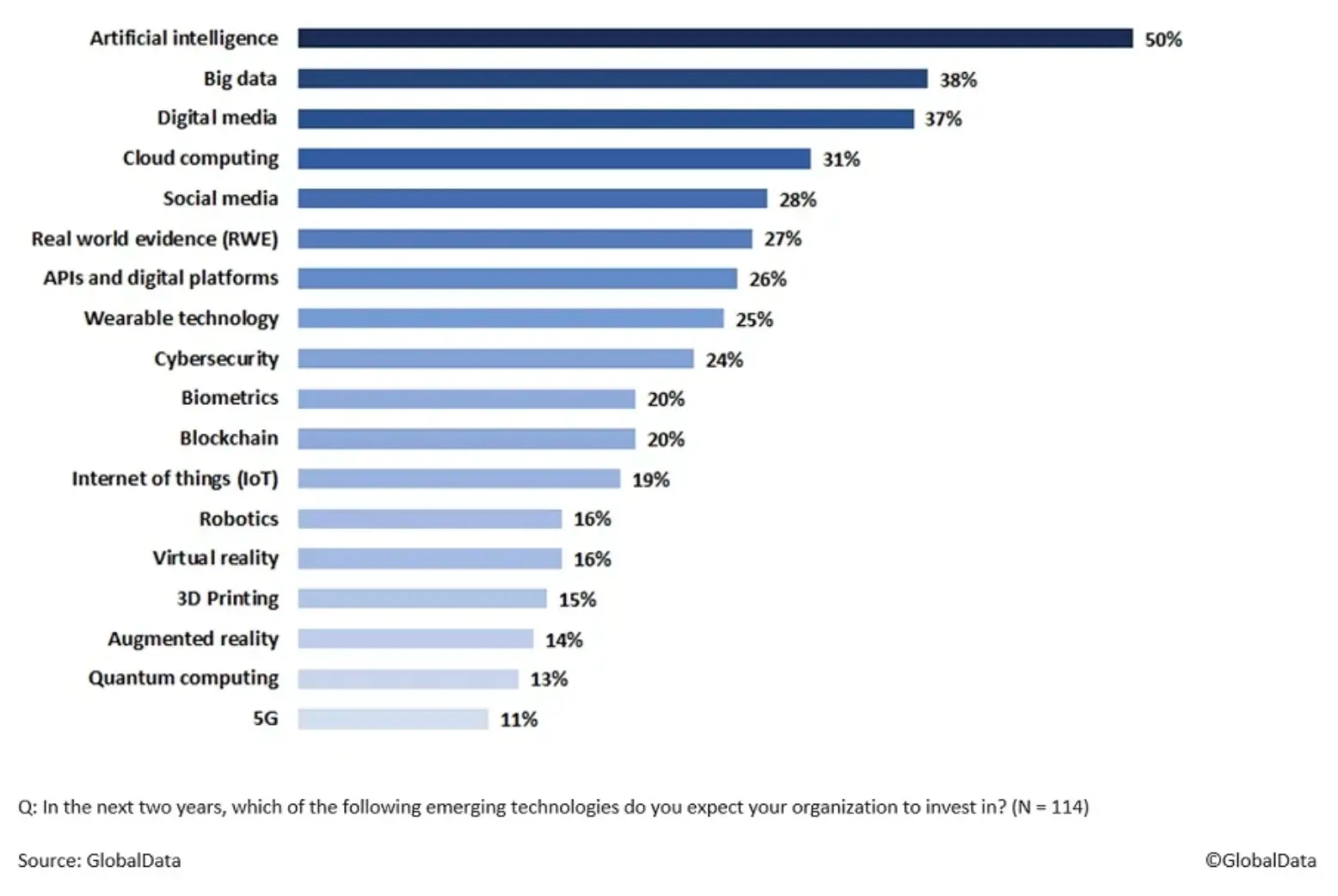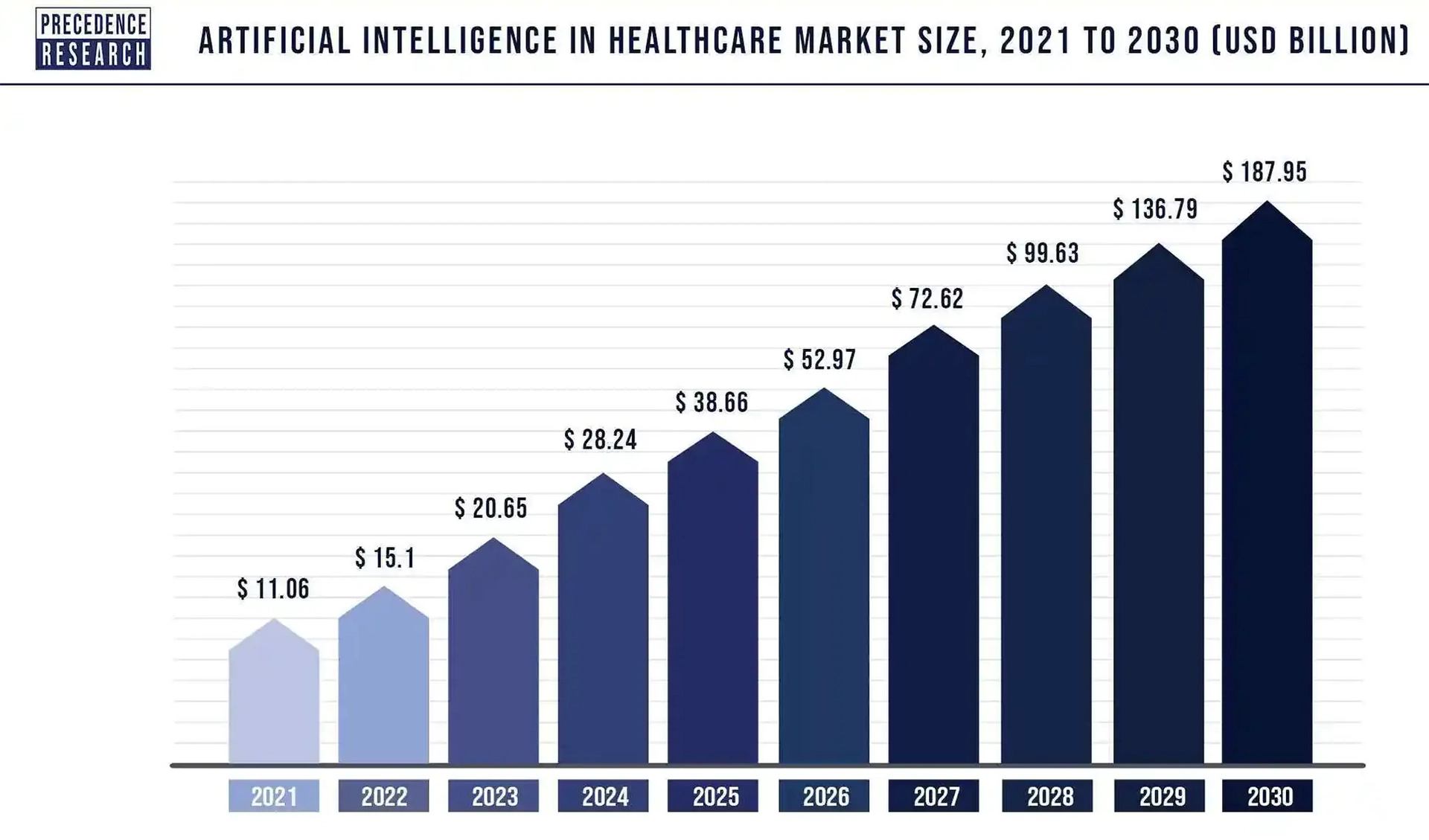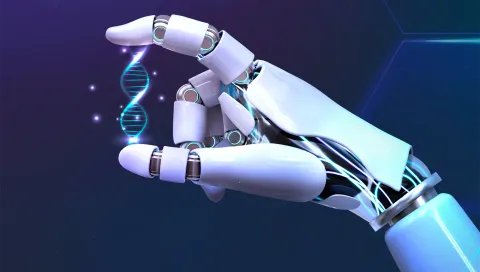Global trends
Al's use in healthcare is a huge milestone for global humanity.
The possibilities of using technologies such as artificial intelligence (AI) and big data methods can be compared to the revolution of penicillin discovery.
Smart Service World research report
Previously, doctors had to spend much time identifying patterns for certain diseases. Different types of rashes and tumors made it difficult to diagnose a patient, and a lack of experience often led to medical errors.
Unlike a medical specialist, artificial intelligence can analyze a patient's medical history, laboratory test results, and treatment results in a split second.
With this data, the systems can make predictions about how the disease will progress, identify potential risk factors, and provide individualized recommendations for treatment and complication prevention.
Here are some current trends in the use of these technologies in medicine:
Personalized treatment and individualized therapy
Insilico Medicine is actively using artificial intelligence to create new molecules that can be used to develop personalized therapies in the future. The company has already developed several potential drugs and recently launched human trials of drugs designed by artificial intelligence.
Remote patient support
While telemedicine has been growing in popularity over the past decade, the COVID pandemic has greatly accelerated this process. Remote consultations have become an everyday process. This has led to the popularity of artificial intelligence solutions that help to monitor patient health remotely.
Expanding the use of Al in medicine
Data visualization for disease diagnostics, scientific research, and the development of new medicines are just a few areas where artificial intelligence has recently been applied. But it is no longer just scientific research that is limited to universities and research institutes: artificial intelligence is used to invent medicines in pharmacological laboratories and medical facilities where thousands of patients come every day.
Investment growth in the sector
Artificial intelligence in healthcare has been considered one of the most attractive investment sectors in recent years. According to the GlobalData report, healthcare companies will prioritize AI as the primary investment focus in the next two years.

How Al helps to detect diseases
In disease diagnostics, artificial intelligence is widely used to process both large amounts of data and individual cases. It is trained to analyze a variety of images, such as X-rays, MRI or computed tomography, and a host of other data.
Here are some examples of how artificial intelligence is used in disease diagnostics:
Lung disease detection
Artificial intelligence is widely used in lung computed tomography analysis. In 2018, a team of scientists from the University of California developed an algorithm to analyze CT lung scans and detect small tissue areas that may be signs of early-stage cancer. This showed impressive results: the accuracy of lung cancer detection was a staggering 94.4%.
Thus, even today, the systems can analyze CT scan results and detect lung cancer at the stage when the chances of completely overcoming the disease are still very high.
Predicting the risks of cancer and diabetes
In 2016, scientists from Mount Sinai Hospital (New York) introduced the Deep Patient system. The system can detect correlations between various medical indicators and predict potential risks of various diseases like diabetes, cancer, heart disease, and others.
In studies conducted using Deep Patient, researchers have found a link between pulmonary hypertension and bone disease, as well as between Parkinson's disease and depression. The program was also used to predict infectious diseases in the intensive care unit and the relationship between different heart diseases.
Early detection of glaucoma and other eye diseases
In 2018, experts at Duke University Medical Center in the United States trained a neural network to analyze the photos of patients with different stages of glaucoma. Artificial intelligence detected signs of the disease in the photo that even experienced specialists did not notice. This made it possible to diagnose and start treatment in time and significantly reduce the risk of vision loss. The researchers presented the results of the study in the journal Nature.
By the way, in the same 2018, IDx managed to approve a system for automatic diagnosis of diabetic retinopathy based on retinal images in the United States.
Skin disease diagnostics
In 2018, a team of scientists from Stanford University in California presented the DeepSkin system. The system can detect 25 different skin diseases with an accuracy of over 90% by analyzing skin photos.
Also, scientists from Queen Mary University of London and Skin Analytics have taught their system to analyze photos of moles - pigmented nevi and assess the risks of their transformation into malignant tumors. The study results showed that artificial intelligence accurately determines the risk of skin cancer - at the level of an experienced dermatologist.
How artificial intelligence helps create medicines
The development of any drug is a process that can take decades. It requires both multimillion-dollar investments and a considerable number of specialists. On average, the cost of discovering and developing just a single drug is at least $1.2 billion, and it takes a pharmaceutical company at least 12 years to bring it to market. Automated systems and algorithms can speed up these processes and reduce the time to manufacture medicines. It is only a matter of time before such technologies are widely used in the industry.
Artificial intelligence can help at many stages of drug development. In particular, it can help to:
- select potential drugs by analyzing data on chemical compounds and their interaction with pathogens;
- predict the effectiveness of drugs by analyzing the structure of drug molecules;
- develop individualized treatment courses by analyzing patients' medical histories;
- optimize research, which usually takes a lot of time for scientists.
Artificial intelligence is already being used in several projects to develop new medicines. Here are some examples:
Identifying new chemical compounds and combinations for medicines
In recent years, Insilico Medicine has become known for using artificial intelligence to create new drug compounds that should help treat cancer and other diseases in the future. The company's primary goal is to reduce the time for drug development.
Increase in the efficiency of clinical trials
Clinical trials are a long process. And neural networks can speed it up. Thus, the British company BenevolentAI uses artificial intelligence to analyze data and identify drug efficacy indicators. It tracks the interaction of drugs with various biomarkers and performance indicators. The goal is to understand which drugs can be most effective in treating a particular disease.
Development of individualized treatment regimens
Each clinical case requires an individual approach and individualized treatment. Atomwise makes extensive use of artificial intelligence to predict which medications may be effective in each individual case. This analysis takes into account genetic data and other factors that may affect the disease. Thus, the company tries to create personalized treatment regimens that would be as effective and safe as possible for patients.
Predictions about side effects of medications
Reducing drug side effects is an integral element of any treatment, especially when drugs must be taken for a long time.
Merative (previous IBM Watson Health) is developing the Watson for Drug Discovery system. It uses neural networks to analyze large amounts of medical data and identify new drugs' potential effectiveness and side effects. OWKIN also announced the development of a system in which neural networks predict possible side effects of drugs.
The industry attracts a lot of investment. Insilico Medicine, which we mentioned earlier, was able to raise $37 million from investors. Another company on our list, BenevolentAI, also raised more than $100 million from Woodford Investment Management and Lansdowne Partners. In addition, in 2021, Insitro, which also widely uses artificial intelligence in the drug development process, was able to raise about $400 million from investors BlackRock, Canada Pension Plan Investment Board, and T. Rowe Price.
Virtual assistants. How technologies help doctors and patients communicate
Patient stays in hospitals require communication between patients and doctors. Artificial intelligence also helps in such cases, as it can improve the quality of medical care. In particular:
Assistance in diagnostics
In 2018, Google Health introduced a program that determines the risk of cardiovascular disease. The neural network analyzes images of blood vessels, as well as risk factors such as age, gender, smoking, and blood pressure. To create the system, the developers used data from over 284,000 patients. In a study published in the journal The Lancet Digital Health, the new system's results were significantly more accurate compared to the predictions of experienced cardiologists.
In the winter of 2020, researchers from England announced that they had successfully used Google Health to predict the risk of cardiovascular disease in patients at a local hospital aged 40 to 69.
Patient health monitoring
Artificial intelligence is widely used in monitoring health indicators - both in hospitals and remotely when the patient is at home. For example, Cogito's solution analyzes voice and recognizes patients' emotions when they talk to medical staff. This development helps to identify patients who need additional attention or support from doctors.
Virtual assistants for communication between doctors and patients
The Sensely system developed in the United States uses a chatbot interface designed to communicate with patients and medical professionals and provide them with advice on diagnosis and treatment. The system's artificial intelligence can recognize disease symptoms and offer users appropriate recommendations based on individual needs and health indicators.
Another virtual assistant from the Swiss company Biofourmis analyzes patient data, such as heart rate, blood oxygen, and sugar levels. It recognizes abnormalities and sends notifications to remote doctors.
Data security and diagnostic errors. What challenges still need to be overcome?
Although artificial intelligence is widely used in medicine, many unresolved problems remain in this area. Let us mention a few of them.
Insufficient quality of results
A doctor is responsible for the diagnosis, not artificial intelligence. And the doctor may face the fact that the system may not accurately recognize the disease, for example, in X-rays. This can happen if the system is trained on insufficiently high-quality or limited data. This can lead to incorrect treatment or underdiagnosis of patients, which can have serious consequences for their health.
For example, in 2020, researchers at the Israeli medical company InnerEye presented a system that can independently identify tumors in patient images. This, in turn, reduces the time for processing examinations and treatment planning by up to 90%. However, in practice, such a system still cannot replace a doctor.
There is no doubt that InnerEye is saving me time. It's speeding up the process so I can concentrate on looking at a patient's diagnostic images and tailoring treatment to them. But it's important for patients to know that the AI is helping me in my professional role; it's not replacing me in the process. I double-check everything and can change it if I need to
Yvonne Rimmer, consultant clinical oncologist at Addenbrooke's
Lack of transparency
Very often, AI works based on very complex algorithms and models. Complex algorithms and their decisions in diagnostics are complicated for specialists to verify. Doctors usually do not understand what data is fundamental to making an important decision, which often affects a person's life.
AI needs to be improved
2023 and 2022 were breakthrough years for AI. Especially after the American startup OpenAI made its prototype chatbot ChatGPT available to the public for free in November 2022. But doctors warn that such programs should be distinguished from services that analyze X-rays, blood and tissue samples, or MRIs. And they should not be used for self-diagnosis.
ChatGPT is a good foundation... But this powerful tool can write things that are inaccurate to the point of being absolutely ridiculous, even if they may seem very plausible... Overconfidence is one of the biggest problems with this model.
Albert Neff of the Lubeck Hospital in Germany
Ethics and personal data security issues
The use of AI can create ethical issues, for example, in the confidentiality and protection of patients' personal data. Protecting personal data from fraudsters is another aspect to consider when using machine learning in medicine.
AI is still learning
We shouldn't forget that AI technologies should be considered as being at the development stage. Therefore, many other issues may arise that require research and resolution.
Research and investment. What to expect in the future
AI in healthcare has every chance to create a revolution: it can help find a cure for serious diseases, process data for innovative research, and select the "perfect" treatment regimen for a patient. All of humanity always need medicine, and a considerable number of diseases require the latest treatments and expanded diagnostic capabilities. The number of studies in the field has grown significantly, and there will be many more in the future. This means more chances for effective diagnosis and treatment and less time for data processing.
Healthcare will become even more personalized, with an emphasis on the patient's individual medical history. Telemedicine will continue to improve, and we should expect that doctors will be able to remotely analyze many more health indicators. Chatbots, virtual assistants - patients will turn to them more actively and from any device - at home, work, or while walking in the park.
Large companies continue to invest in the sector. Microsoft, Google, IBM, Pfizer, Merck, and others are actively investing in the development of medical AI. According to Precedence Research, the global healthcare AI market size was estimated at USD 15.1 billion in 2022 and is expected to surpass USD 187.95 billion by 2030, growing at a CAGR of 37% during the forecast period 2022 to 2030.

Although many developments will become available only with time, artificial intelligence is already actively helping in medicine today. The future, when this technology detects diseases, analyzes patient histories, and offers treatment, has already arrived.

